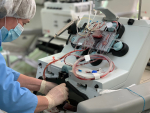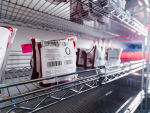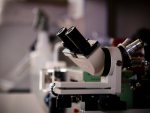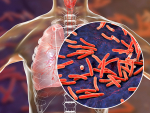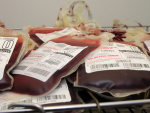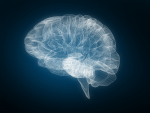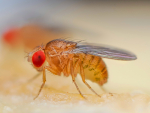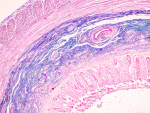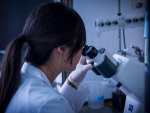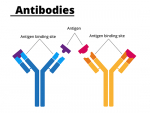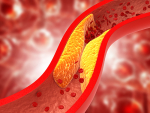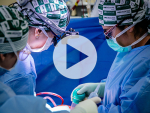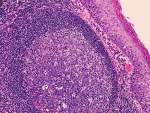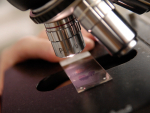Displaying items by tag: department of pathology
The Transfusion Medicine Service in the UAB Department of Pathology performs therapeutic apheresis on patients who have an illness associated with an abnormal cellular or plasma-based blood component.
Tagged under
Tagged under
The study’s findings suggest a combination therapy could be a more effective and a safer approach to treating metastatic colorectal cancer.
Tagged under
Goal of this UAB-led service is transforming the global landscape of TB research through accelerated study of human TB tissue.
Tagged under
American Red Cross will collaborate with UAB and Birmingham Barons to host two blood drives, as experts encourage the public to donate if able.
Tagged under
By prohibiting the Activin A protein from functioning, researchers were able to halt the development of dyskinesia symptoms and effectively erase the brain’s “bad memory” response to L-DOPA treatments.
Tagged under
Use of high-speed video microscopy and artificial intelligence provides calculated statistics like diastolic and systolic diameters, fractional shortening, and ejection fraction.
Tagged under
A newly identified subset of intestinal epithelial cells act as both the major target and a key responder in a mouse model of gut infection by the bacteria Citrobacter rodentium.
This semester, at least 2,963 students are eligible to graduate, and more than 1,871 students are expected to walk in the three ceremonies in Bartow Arena.
Tagged under
- school of medicine
- release
- school of optometry
- commencement
- school of dentistry
- commencement 2024
- school of nursing
- office of the provost for student and faculty success
- department of music
- college of arts and sciences
- department of pathology
- honors college
- school of education
- school of engineering
- collat school of business
- school of health professions
- school of public health
The program seeks to support and foster multidisciplinary collaborations, especially between UAB clinicians and basic and physician scientists.
Tagged under
The site-directed addition of a polymer on the antibody trastuzumab helped this cancer-fighting antibody cross the blood-brain barrier.
Tagged under
These immune CD8 T cells may provide a target for treating the buildup of fatty lesions in the arteries called atherosclerosis.
Tagged under
Vascular stiffening and calcification, which is accelerated by aging, affects multiple organs and plays a role in dementia. There are no treatments for vascular calcification, which makes arteries harden.
Tagged under
Vivek Lal, M.D., associate professor in the Department of Pediatrics at UAB Heersink School of Medicine and the founder of both ResBiotic Nutrition and Alveolus Bio, was given the 2023 Award for Excellence in Entrepreneurship.
Tagged under
- release
- harbert institute for innovation and entrepreneurship
- school of medicine
- department of pathology
- department of pediatrics
- department of urology
- department of medicine
- division of pulmonary allergy and critical care medicine
- department of biochemistry and molecular genetics
- college of arts and sciences
- department of biology
- department of chemistry
- school of engineering
This study, performed in a pre-clinical human model, is the first time xenotransplanted pig kidneys have shown clearance of creatinine and shown a standard immunosuppression regimen may be sufficient.
Tagged under
Some PD-1+CXCR5+CD4+ T cells will become germinal center-Tfh cells that are essential for B cells to become high-affinity antibody-producing cells. Others do not take that path, instead becoming memory T cells.
Tagged under
In a mouse model, border-associated macrophages, not microglia, were essential for the neuroinflammation that precedes neurodegradation. Targeting this subset could be a disease-modifying therapy in neurodegenerative disease.
Tagged under
The baby boy, born in late May 2023, is the first baby born from a uterus transplant outside of a clinical trial and UAB’s first baby from its uterus transplant program.
Tagged under
- release
- university of alabama system
- uab medicine
- school of medicine
- transplantation
- comprehensive transplant institute
- department of surgery
- division of transplantation
- department of obstetrics and gynecology
- division of gynecologic oncology
- division of maternal fetal medicine
- division of reproductive endocrinology and infertility
- department of radiology
- department of pathology
- department of medicine
- division of infectious diseases
- department of pediatrics
- womens history
This funding will be used to research multiple health conditions, including alcohol-related liver disease, Alzheimer’s disease, breast cancer, heart failure, inflammatory bowel disease and Zhu-Tokita-Takenouchi-Kim syndrome.
Tagged under
Suits for Success’ impact transcends to three other UAB closets and a community closet serving students, patients and underprivileged women facing domestic violence.
Tagged under
